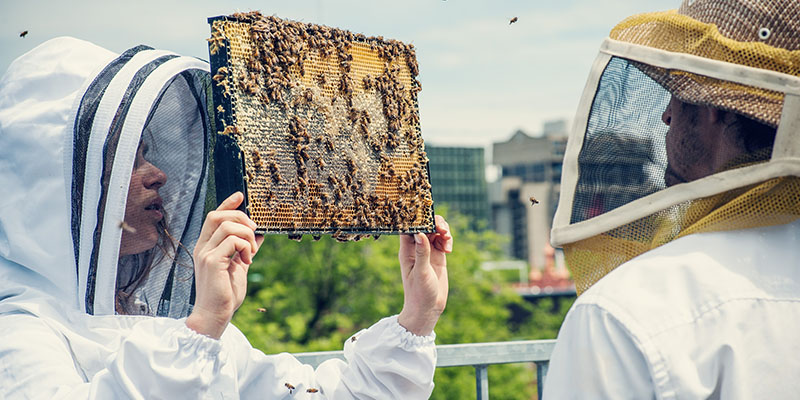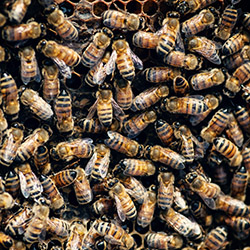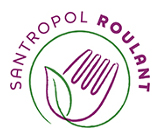
Of course, with new seasons come more hives, we’ll keep you posted!

Keep in touch!
Frequently Asked Questions
This, along with the rotation of responsibilities (facilitation, note taking, interventions) within the collective, ensures that everyone has their place, no matter their level of experience, level of education, language, age, gender, ethnic origin, political opinions or sexual orientation.
Collective work is mainly a way to learn from others!
Santropol Roulant’s Beekeeping Collective is a grouping of beekeepers who come together to foster and uphold a sustainable and healthy culture of beekeeping within Montreal. As a collective of Roulant, we work to strengthen and nurture our local community by bringing together people from all walks (including members of the group) of the source of their food. Our hives are located on the roof of Roulant (111 Roy East) and the Frank Dawson Adams Building at McGill University.
1) a collective approach is taken to being aware and engaged stewards of apiculture to help ensure that local bee populations maintain their numbers, health and ability to uphold their important corner-stone role in the world of biodiversity
2) experienced and educated apicultures and aspiring beekeepers alike ensure that honey bees may find as much of an inhabitable environment in urban areas as in the wild.
-
- The selection process for new members is in late winter each year, just before the start of the season (March). Given the impressive number of applications to join the group (approx. sixty every year), a selection process is required. The selection will most likely be based on the following evaluation criteria:
-
- Availability (to be available on average 5 hours per week (2 hours in a meeting, 3 hours during the day when the majority of beekeeping processes are carried out)
- Enthusiasm and motivation
- Sense of responsibility
- Experience
- Ability to function in a group
- Interest in sharing its knowledge with the community (workshops, events, blog)
- Sense of initiative
- Diversity
To find out about the next call for submissions, we invite you to subscribe to our bi-monthly newsletter or follow us on our beekeeping blog.
Each person has their place in the collective, regardless of their level of experience, level of education, language, age, gender, ethnic origin, political opinions or sexual orientation.
- keeping Santropol’s hives alive and healthy while keeping the well-being of our neighbours in mind;
- taking charge of our own education for urban beekeeping;
- sharing our educational experiences with the community via a blog, workshops;
- attending group meetings (2 h / wk) taking place on Wednesdays from 18 am to 20 pm;
- dedicating a few hours per week (on average 3 hours / week) for the functions of the collective outside of meetings (managing the hives, blog, responding to public inquiries, performance, etc.)
- getting involved on a weekly basis between the months of March and October (duration of the beekeeping season) and monthly between November and February
- staying in touch with other members of the group through the collective’s mailing list.
- To highlight the importance of pollinators in local food production;
- To experiment with beekeeping in urban areas;
- To re-connect urbanites to the source of their food;
- To dispel misconceptions that are so commonly placed upon bees;
- To train new beekeepers.
